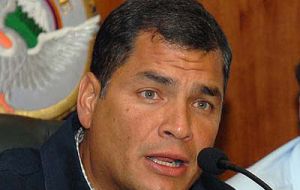MercoPress. South Atlantic News Agency
Ecuador’s Correa wins referendum to tighten grip on the Judiciary and the press
 Rafael Correa celebrates victory
Rafael Correa celebrates victory Ecuadorian President Rafael Correa claimed victory in a referendum on government and social reforms that critics have charged is a disguised attempt to consolidate more power in a still fragile democracy.
“The Ecuadorian people have triumphed. The truth has triumphed,” he said Saturday on state-run Ecuador TV.
Official results are not expected until later in the week, but exit polls show the referendum is likely to pass. A private tracking poll by Cedatos-Gallop showed an average of 57% of voters backing all 10 questions on a referendum that was essentially a vote of confidence on Correa, 48, who has governed since 2007.
An exit poll by Santiago Pérez Investigacion y Estudios showed more than 60% said “Yes” to all questions.
Ecuadorians went to the polls Saturday to vote on a wide-ranging referendum that included innocuous questions such as whether to ban public shows where animals are killed. But other questions were affronts to checks and balances and freedom of expression, critics charged.
One of the controversial questions asked was whether media owners and their shareholders should be prohibited from owning stock in any company outside of that industry. The same restriction would exist for those in the financial sector.
Correa has said that if approved, the measure would prevent conflicts of interest, but others see it differently.
“To ask a person to only be a shareholder in a media company, and not be able to invest in anything else, is not something realistic in a country like Ecuador” journalist Janeth Hinostroza said before the vote.
Another proposal would create a commission to regulate broadcast content to avoid “media excesses.”
As stated on the referendum, the question lists sexual content, violence and discriminatory broadcasts that could be regulated. Critics like Hinostroza said that this power could be spread to censor news broadcasts and opinions.
“This is something that worries us because it will be a threat against freedom of expression,” she said.
Roxana Alvarado, a lawmaker and supporter of Correa, said the news media is not being targeted. “No one is talking about censorship,” she said before the vote. “That is not the message, even if the media wants to make it so.”
One of the measures proposes the creation of a special commission consisting of delegates selected by the president and the congress to restructure the judicial system.
“The judicial council has not performed its function because of its commitment to timidity and indecisiveness,” Correa said in January. He said the special commission would have the power to evaluate and sanction judges with the goal of eliminating corruption.
With the president choosing one of the commission members and his majority congress choosing another, the president in effect would have control over the selection of new judges, critics have said.
“This means that with two votes, with two of the members, you can name judges, sanction them and remove them,” said Ecuadorian analyst Santiago Guarderas.
Some wonder whether Correa is trying to reassert his authority after a period of unrest last September that he called an attempted coup.
On September 30, about 200 police officers protested for better pay. Correa went to the site of the protest in an attempt to appease them, but the opposite happened. Tensions rose, and the president was surrounded by protesters and whisked away to a police hospital. Ecuadorian troops eventually stormed the hospital and released the president.
“President Correa is attempting to incorporate more power, to have more control, to use this referendum against constitutional mechanisms, with the objective of having more power,” said Carlos Alberto Montaner, an analyst, before the vote.
Analysts say that an overwhelming yes vote would improve President Correa's standing ahead of presidential elections in 2013, for which he could stand for a third time. However he has stated that he’s not interested in a third mandate since he has promised his Belgian wife they would spend time in Louvain.




Top Comments
Disclaimer & comment rules-

Read all commentsIt seems to me that if 65% simply tick the Yes box straight down the ticket on ALL the questions, all I am seeing is a highly unsophisticated electorate believing the dictum “Yes good, No bad”.
May 09th, 2011 - 08:42 pm 0Commenting for this story is now closed.
If you have a Facebook account, become a fan and comment on our Facebook Page!